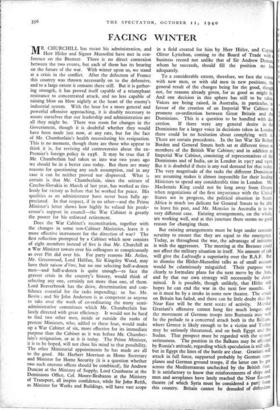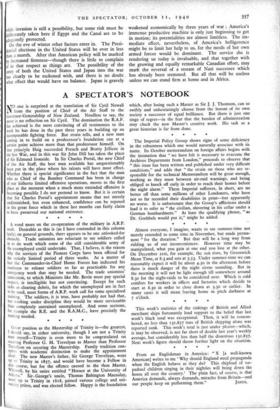FACING WINTER
a
MR. CHURCHILL has recast his administration, and Herr Hitler and Signor Mussolini have met in con- ference on the Brenner. There is no direct connexion between the two events, but each of them has its bearing on the future of the war. With winter upon us, we stand at a crisis in the conflict. After the defection of France this country was thrown necessarily on to the defensive, and to a large extent it remains there still. But it is gather- ing strength, it has proved itself capable of a triumphant resistance to concentrated attack, and no less capable of raining blow on blow nightly at the heart of the enemy's industrial system. With the hour for a more general and powerful offensive approaching, it is doubly necessary to assure ourselves that our leadership and administration are all they might be. There was room for changes in the Government, though it is doubtful whether they would have been made just now, at any rate, but for the fact of Mr. Chamberlain's health necessitating his resignation. This is no moment, though there are those who appear to think it is, for reviving old controversies about the ex- Premier's foreign policy in 1938. It may be true that if Mr. Chamberlain had taken us into war two years ago we should be in a better case today. But there are many reasons for questioning any such assumption, and in any case it can be neither proved nor disproved. What is certain is that Mr. Chamberlain, since the seizure of Czecho-Slovakia in March of last year, has worked as tire- lessly for victory as before that he worked for peace. His qualities as an administrator have never been fully ap- preciated. In that respect, if in no other—and the Prime Minister's letter shows how highly he valued his prede- cessor's support in council—the War Cabinet is greatly the poorer for his enforced retirement.
Does the War Cabinet's reconstitution, together with the changes in some non-Cabinet Ministries, leave it a more effective instrument for the direction of war? The first reflection prompted by a Cabinet which now consists of eight members instead of five is that Mr. Churchill as a War Minister towers over his colleagues as conspicuously as ever Pitt did over his. For party reasons Mr. Attlee, Mr. Greenwood, Lord Halifax, Sir Kingsley Wood, may have their raison d'être, but no one selecting half-a-dozen men—and half-a-dozen is quite enough—to face the gravest crisis in the country's history, would think of selecting any one, certainly not more than one, of them. Lord Beaverbrook has the drive, determination and con- fidence essential for the tasks impending; so has Mr. Bevin ; and Sir John Anderson is as competent as anyone to take over the work of co-ordinating the many semi- administrative committees which Mr. Chamberlain has lately directed with great efficiency. It would not be hard to find two other men, inside or outside the ranks of present Ministers, who, added to these four, would make up a War Cabinet of six, more effective for its immediate purpose than the Cabinet as it was before Mr. Chamber- lain's resignation, or as it is today. The Prime Minister, it is to be hoped, will not close his mind to that possibility. The other Ministerial appointments he has made are all to the good. Mr. Herbert Morrison as Home Secretary and Minister for Home Security (it is a question whether two such onerous offices should be combined), Sir Andrew Duncan at the Ministry of Supply, Lord Cranborne at the Dominions Office, Col. Moore-Brabazon at the Ministry of Transport, all inspire confidence, while Sir John Reith, as Minister for Works and Buildings, will have vast scope in a field created for him by Herr Hitler, and Capt. Oliver Lyttelton, coming to the Board of Trade with business record not unlike that of Sir Andrew Dunc whom he succeeds, should fill the position no less adequately.
To a considerable extent, therefore, we face the winter with new men, or with old men in new positions, the general result of the changes being for the good, though not, for reasons already given, for as good as might be. And one decision in this sphere has still to be taken. Voices are being raised, in Australia, in particular, in favour of the creation of an Imperial War Cabinet to promote co-ordination between Great Britain and the Dominions. This is a question to be handled with dis- cretion. If there were any general desire in the Dominions for a larger voice in decisions taken in London there could be no hesitation about complying with it. There are certain precedents. In the last War Sir Robert Borden and General Smuts both sat at different times as members of the British War Cabinet; and in addition an Imperial War Cabinet, consisting of representatives of the Dominions and of India, sat in London in 1917 and 191S. But it is doubtful if there is any real demand for that tcday. The very magnitude of the tasks the different Dominions are assuming makes it almost impossible for their leading Ministers to spend any considerable time in London. Mr. Mackenzie King could not be long away from Ottawa when negotiations of the first importance with the Unite) States are in progress, the political situation in South Africa is much too delicate for General Smuts to be able to leave his post, and Mr. Menzies in Australia is in no very different case. Existing arrangements, on the whole, are working well, and at this juncture there seems no good reason for changing them.
But existing arrangements must be kept under constant scrutiny to ensure that they are equal to the emergency. Today, as throughout the war, the advantage of initiative is with the aggressors. The meeting at the Brenner could not affect the military situation in itself. No amount of talk will give the Luftwaffe a superiority over the R.A.F. But to dismiss the Hitler-Mussolini talks as of small account would be calamitously misguided. Their purpose was clearly to formulate plans for the next move by the Axis, and by that our own strategy will necessarily be deter- mined. It is possible, though unlikely, that Hitler still hopes he can end the war in the next few months. If so it must be by a stroke in some new theatre. The attack on Britain has failed, and there can be little doubt that the Near East will be the next scene of activity. Marshal Graziani's offensive cannot hang fire much longer, and the movement of German troops into Rumania may well be the prelude to a concerted attack both in the Balkans. where Greece is likely enough to be a victim and Turkey may be seriously threatened, and on both Egypt and the Sudan. That prospect must be regarded with the utmost seriousness. The position in the Balkans may be affected by Russia's attitude, regarding which speculation is still idle. but in Egypt the lines of the battle are clear. Graziaru attack in full force, supported probably by German aero- planes and German ground troops, if the latter can be got across the Mediterranean unchecked by the British fleet. It is satisfactory to know that reinforcements of ships and men and aeroplanes have lately reached the Near Eastern theatre (of which Syria must be considered a part) from this country. Britain cannot be denuded of defenders bile invasion is still a possibility, but some risk must be deliberately taken here if Egypt and the Canal are to be adequately protected.
On the eve of winter other factors enter in. The Presi- dential elections in the United States will be over in less than a month. After that American policy will be marked by increased firmness—though there is little to complain of in that respect as things are. The possibility of the entry of both the United States and Japan into the war has clearly to be reckoned with, and there is no doubt what effect that would have on balance. Japan is gravely weakened economically by three years of war ; America's immense productive machine is only just beginning to get in motion; its potentialities are almost limitless. The im- mediate effect, never theless, of America's belligerence might be to limit her help to us, for the needs of her own armed forces would be dominant. The service she is rendering us today is invaluable, and that together with the growing and equally remarkable Canadian effort, may mark the reversal of a stream of Nazi successes which has already been stemmed. But all that will be useless unless we can stand firm at home and in Africa.



























 Previous page
Previous page